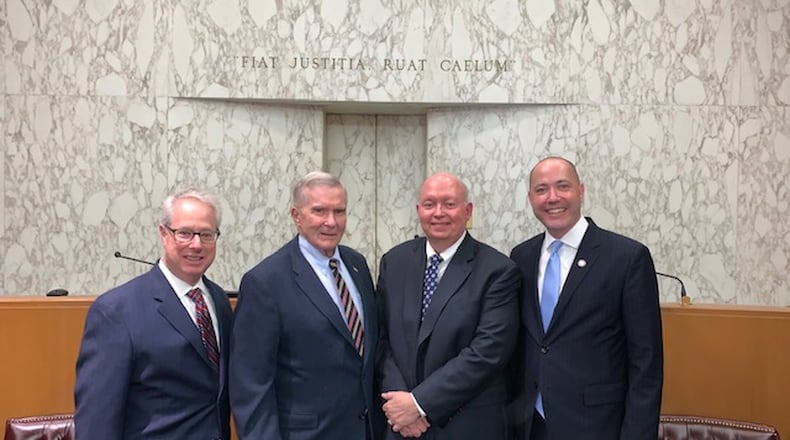It was a Friday afternoon in 1996 when a clerk from the U.S. Supreme Court called. The justices wanted Georgia to file an emergency brief in a case involving presidential primary ballots.
“I can get something to the court on Monday,” replied a startled Dennis Dunn, the state’s lawyer on the case. No, the clerk responded, how about noon tomorrow? Dunn hung up the phone and got right to it.
In a recent interview, Dunn said he has a new perspective on the crushing deadline imposed upon him.
“I had nine justices on the U.S. Supreme Court waiting to hear what we had to say,” Dunn said. “I would never have gotten to do something like that anywhere else, any other time.”
On Friday, Dunn retired from the State Attorney General’s Office after working there 36 years. His tenure includes serving four attorneys general, traveling across Georgia to attend hearings held inside small prison courtrooms and representing the state in cases that reached the highest court in the land.
After being appointed AG in 2016, Chris Carr named Dunn his chief deputy.
“Dennis has become one of my most trusted advisers,” Carr said. “I can always count on him to provide a sound opinion that is rooted in the rule of law and protects the interests of the people of Georgia that we serve.”
"He was a stalwart of that office," said U.S. District Court Judge Mark Cohen, who once worked with Dunn. "His leaving, to me, is the end of an era. The government needs more people like him."
Dunn, 65, said he decided to become a lawyer when he was serving in the Air Force. Before graduating from Emory University law school in 1983, one of his professors strongly urged him to try to land a job at the state AG’s office.
Dunn showed up one day and was interviewed by then-AG Mike Bowers before being ushered away to talk to other lawyers in the office. Bowers told Dunn to stop by his office before he left the building. When Dunn returned, Bowers had a question: "Can you start next week?"
Dunn took the job, starting out with an annual salary of $19,500, about half the going rates of Atlanta law firms at the time.
Dunn first worked in the criminal division. This meant crisscrossing the state to attend hearings in a government-issued Ford Fairmont with no air conditioning and an AM-only radio.
Dunn’s job was to defend convictions obtained by local district attorneys. Many of the hearings were in small courtrooms inside prisons where the inmates were housed. On one occasion, he got stuck inside during a lock-down following a prisoner’s escape.
After seven years, Dunn wanted a change. With a new daughter, reading through murder cases, some of which involved children, took an emotional toll. In 1990, he began representing state agencies, including the Secretary of State’s elections division, which seemed like a good fit for the former political science major.
It also led Dunn to become one of the state’s foremost experts on election law at a time when the U.S. Supreme Court was taking a keen interest in redistricting cases, including some from Georgia.
In 1995, when the high court declared Georgia’s 11th congressional district to be unconstitutional as a result of racial gerrymandering, a special session of the General Assembly was called to redraw the map.
At the onset of that session, then-Lt. Gov. Pierre Howard called to ask Dunn if he’d mind coming over to the Senate chamber and answering some questions. Dunn was needed right away and would be standing in the well of the Senate when fielding questions, Howard added.
Dunn said he’d head over to the Capitol across the street, but only after he took a call from someone else on the line: House Speaker Tom Murphy. Murphy made the same request as Howard, and Dunn likewise agreed but told the speaker he’d have to wait in line.
When Dunn finished up in the Senate, a staffer walked up and informed him, “The House is waiting on you.” The staffer then led Dunn to the other side of the Capitol. Murphy who pounded his gavel for order.
“That,” Dunn recalled, “was one wild day. I had no idea I’d ever do something like that. This has been a wonderful experience.”
Dunn said he now hopes to travel some, with an eye on Ireland, with Barbara, his wife of 40 years. He’s still thankful that Bowers gave him the job offer right from the start.
“It was one of my most outstanding decisions,” Bowers said in a recent interview. “Dennis completely reinforced it. He’s an extremely fine person and a fine lawyer, too. They don’t get any better than Dennis.”
About the Author
Keep Reading
The Latest
Featured




